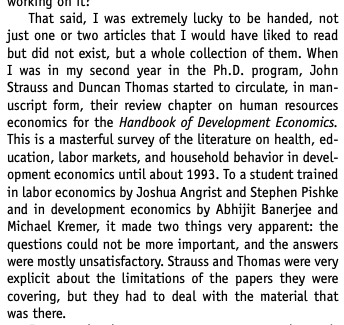Experimenting with a slow burn, "cold takes" variant of @threadapalooza. I commit to starting now, and eventually getting to 100 findings/papers on #creativity in this thread. No promises on coherence or timeline, but I will aim for posts to be maximally useful. Here goes! 0/100
1/100 Currently thinking about why #interdisciplinary research is hard. One key concept is "scatter": how coherent is the literature for a field? If fairly well-defined and small, then it's low scatter; if not, it's high scatter. See Bates (1996) for an overview 



2/100 Important study by Mote (1962): Scholars in fields of study with high degree of scatter (Grp III in Fig.) self-reported needing longer searches (> 30 mins) about 20x more frequently compared to scholars in low scatter fields (Grp I in Fig.)! 



3/100 Echoing these findings, Packer (1979) reported that scholars in high scatter domains had equal success keeping up w/ relevant lit. vs. low-scatter scholars, but at the cost of time (high-scatter 2x more likely to spend > 5 hrs/wk on lit) 



4/100 Packer (1979) also explored if using "Selective Dissemination of Information" (SDI: basically a 1970's recommender system!) could help scholars keep up with lit. 

5/100 Packer (1979) reported a striking result: SDI was associated w/ sig. *lower* efficiency in keeping up w/ low-scatter lit; in contrast, SDI use was **not** associated with efficiency for high-scatter scholars (although there was a numeric trend in a positive direction) 

6/100 Zooming up for a second: why is keeping up with the lit. important for #creativity ? Isn't creativity all about rejecting prior knowledge?
7/100 An important axiom for creative work (esp. creative knowledge work) is that, to transcend what we currently know, you often need to be deeply immersed in the problem: what is known and not known, what limits and new opportunities exist.
8/100 There are many process models of #creativity, with nuances and differences between them, but one commonality is this idea of *preparation*: knowing the domain, "doing your homework", preparing your mind for insight. Sawyer (2012) summarizes this nicely. 



9/100 This is a key paradox of #creativity - on the one hand, prior knowledge often blocks creative insight.
Many researchers (including me!) study the phenomenon of *fixation* (where prior knowledge blocks creativity). See, e.g., sciencedirect.com/science/articl…
Many researchers (including me!) study the phenomenon of *fixation* (where prior knowledge blocks creativity). See, e.g., sciencedirect.com/science/articl…
10/100 See also this entry point into a long list of examples of good ideas that were initially rejected by experts:
https://twitter.com/patrickc/status/133868183212500173
11/100 Welp, bad link, thanks @ArtirKel (also author of the list):
https://twitter.com/patrickc/status/1338681832125001731
12/100 Back to the paradox: prior knowledge can block insight; but OTOH, as we noted, we need a base of knowledge to get to powerful new ideas. Navigating this paradox is a key facet of creative knowledge work, and a core focus of my research.
interlude... it's been a year! time to add some stuff to this slow-burn thread! did some close reading of papers on analogy, conceptual combination, examples, and interdisciplinarity, will share results now
13/100 designs that were measured during an ideation session to have come from a higher percentage of far analogies were perceived as more original and valuable by potential customer judges - [[@dahlInfluenceValueAnalogical2002]]
--> far analogies ++creativity


--> far analogies ++creativity
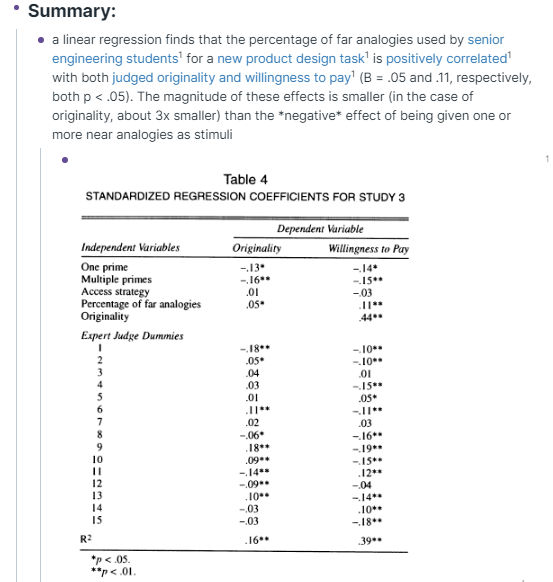


14/100 [[@dahlInfluenceValueAnalogical2002]] is a classic in literature on analogies and creativity. good place to start to trace citations. 
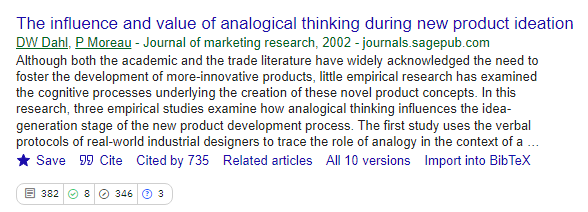
15/100 also from dahl:
Engineering students who were given one or more near analogies as stimuli generated design ideas that were perceived as less original and valuable by potential customer judges, compared to being given no stimuli - [[@dahlInfluenceValueAnalogical2002]]

Engineering students who were given one or more near analogies as stimuli generated design ideas that were perceived as less original and valuable by potential customer judges, compared to being given no stimuli - [[@dahlInfluenceValueAnalogical2002]]


16/100
Innovative biologists rarely used very far analogies in their lab meetings while generating novel scientific concepts; they relied mainly on analogies to the same or other biological organisms - [[@dunbarHowScientistsThink1997]]
--> far analogies ?creativity?


Innovative biologists rarely used very far analogies in their lab meetings while generating novel scientific concepts; they relied mainly on analogies to the same or other biological organisms - [[@dunbarHowScientistsThink1997]]
--> far analogies ?creativity?
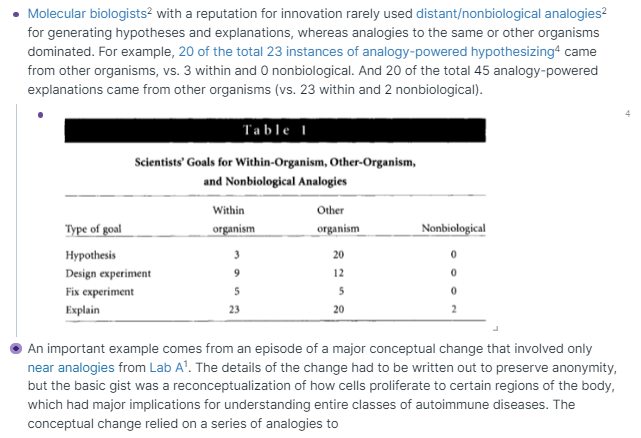


17/100 [[@dunbarHowScientistsThink1997]] is also classic study, pioneered idea of the "in vivo" approach in cognitive science (vs. lab experiments), though there is quite a bit of overlap with older traditions of ethnography.
18/100 side note: A molecular biologist who had made a major scientific conceptual change did not recall any of the spontaneous analogies used to enact that change - [[@dunbarHowScientistsThink1997]]
be careful w/ retrospective accounts of discovery!
be careful w/ retrospective accounts of discovery!

19/100
Far analogies' effects on fluency & diversity depended on timing: ++ideas (but w/ more functional repeats) before ideation, vs. more functionally distinct designs after (during a break), vs. nothing - [[@tsengRoleTimingAnalogical2008]]
--> far analogies ~++creativity


Far analogies' effects on fluency & diversity depended on timing: ++ideas (but w/ more functional repeats) before ideation, vs. more functionally distinct designs after (during a break), vs. nothing - [[@tsengRoleTimingAnalogical2008]]
--> far analogies ~++creativity


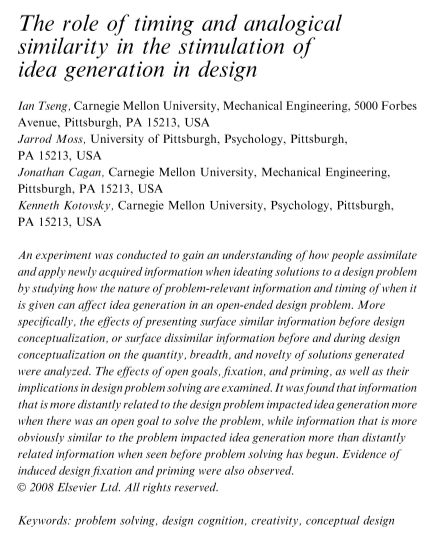
20/100 also: Far analogies' effects on MechE students' novelty of ideas were different depending on timing: more novel ideas when seeing them after problem solving began vs. before - [[@tsengRoleTimingAnalogical2008]] 

21/100 this was one of the first papers i read in grad school. effect sizes were small, but i found the notion of "preparedness" for inspirational stimuli quite... inspirational.
stopping for now, next tweet will unpack one of my favorite theories of creative inspiration
stopping for now, next tweet will unpack one of my favorite theories of creative inspiration
• • •
Missing some Tweet in this thread? You can try to
force a refresh



